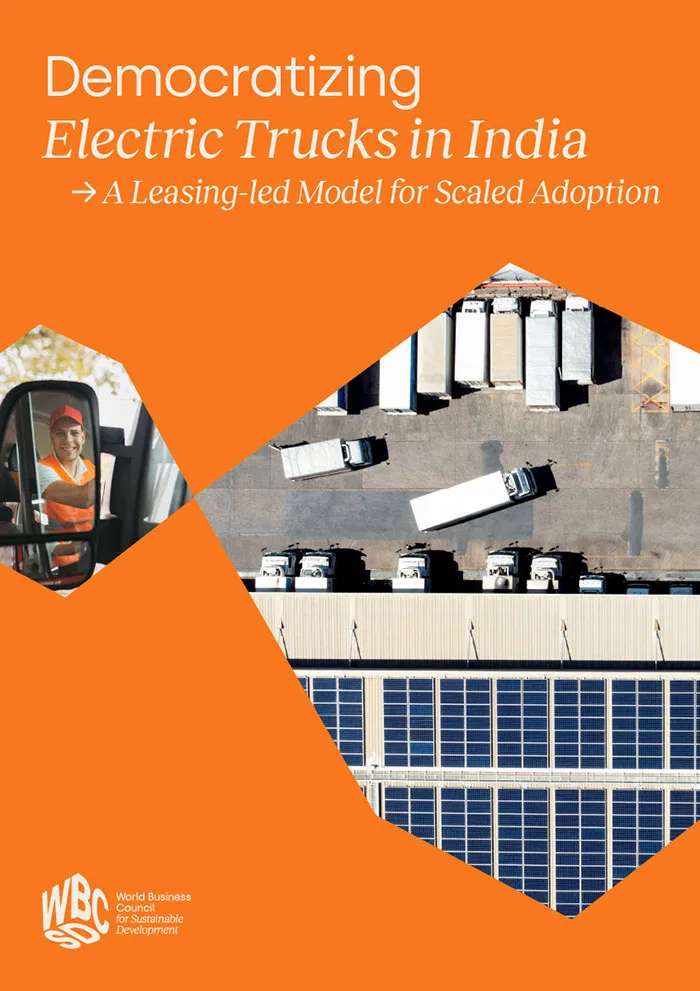Democratizing Electric Trucks in India A Leasing-led Model for Scaled Adoption
Published: June 22, 2025

India’s road freight sector is crucial for the economy but contributes significantly to CO₂ emissions and pollution. With freight volumes set to quadruple by 2050, decarbonization is essential. Zero-emission trucks (ZETs), primarily electric, offer a scalable solution, eliminating tailpipe emissions and offering operational savings. However, widespread adoption is limited, especially among small and medium freight operators (SMFOs) who own over 70% of India’s trucks, due to high upfront costs and lack of access to finance. The current lending system, optimized for diesel trucks, doesn’t support the necessary scale for ZET investment.
This comprehensive financing model is designed to accelerate the ZET transition by tackling these financial barriers and creating a scalable, flexible pathway to unlock ZEV deployment. Developed for the Indian e-truck context, the model is adaptable across vehicle types and geographies.
It shows how innovative financing, particularly leasing, can democratize access to ZETs and accelerate the shift to clean freight. For businesses and financial institutions, it highlights opportunities to de-risk investments, attract commercial financing, overcome upfront costs, and unlock a significant market opportunity aligned with climate goals.
Key Takeaways
- Leasing is a powerful enabler: It’s identified as the most catalytic mechanism to unlock ZET adoption, especially for SMFOs, by replacing upfront CAPEX with manageable monthly fees and shifting asset risk.
- Dedicated Leasing Facility: The report proposes a professionally managed facility to aggregate demand, standardize terms, bundle services, and blend finance, directly reducing capital barriers and making ZETs affordable.
- Blended Finance & Risk Mitigation: The model uses blended capital (public, concessional, commercial) and de-risking instruments (guarantees, long-term contracts, carbon finance) to improve bankability and reduce lender exposure.
- Collaborative Action Needed: Successfully scaling the model requires synchronized action and cross-sector coordination across government, finance, and industry.
- The model provides the foundation; coordinated action from all stakeholders is now needed to pilot, refine, and scale this model for a cleaner, more inclusive freight future.
Get Involved
To learn more, explore collaboration opportunities please contact: Urska Skrt, Lead, Transport & Mobility, WBCSD
This work demonstrates that decarbonization freight transport creates business innovation and opportunity. In India, leading businesses are scaling adoption and investing in electric trucks, showing that ambitious climate action and economic growth can go hand in hand. This innovative leasing model highlights the power of collaboration across the value chain—and underscores the critical role financial institutions play in enabling inclusive, scalable solutions. At WBCSD, we’re proud to support this momentum by bringing business leadership together with other key stakeholders to help transform value chains.
– Diane Holdorf, Executive Vice President, Pathways, WBCSD
Decarbonising logistics is a critical step in achieving our sustainability goals. Integration of electric trucks in our logistics is a key building block, in addition to modal shifts that we are working on. Scaling such transformation demands a right combination of innovative financial models and ecosystem collaboration. This roadmap is a timely and essential enabler, aligning industry, financial institutions and policy to address systemic barriers and build momentum for zero-emission freight adoption.
– Deeksha Vats, Group Chief Sustainability Officer, Aditya Birla Group
Fujitsu has demonstrated the power of a data-driven approach to EV infrastructure optimization. Our field trials, focused on enabling fleet operators to improve efficiency and economics, resulted in a 70% reduction in per-delivery charging time, and a 13% reduction in fuel costs. This underscores our conviction that data is key to accelerating EV adoption. We believe the leasing models highlighted in the report have the potential to address many of the financial and infrastructure challenges related to the adoption of zero-emission trucks.
– Sinead Kaiya, EVP, Global Solutions Business Group, Fujitsu